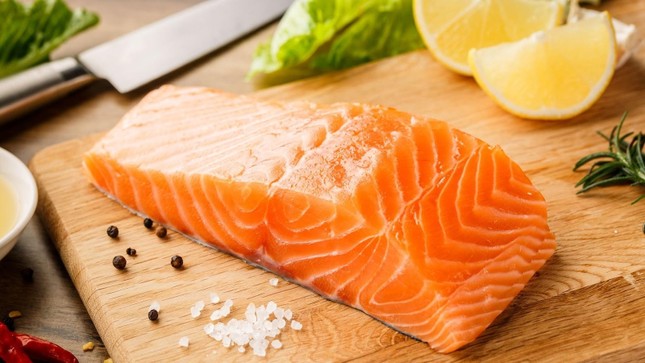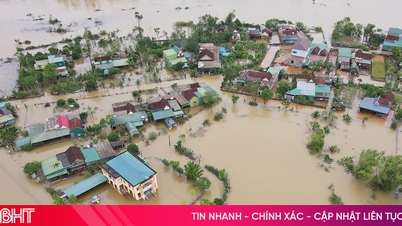Salmon is a nutritious food. However, making the following mistakes when eating salmon will make the dish less delicious and reduce its nutritional value.
The benefits of salmon
Reduce the risk of heart disease and stroke
Salmon is rich in omega-3 fatty acids that help improve blood cholesterol levels and regulate blood pressure. Omega-3 also helps reduce the risk of blood clots that lead to blood vessel blockage, helping to prevent heart disease and reduce stroke.
Salmon is good for hair and skin
Salmon is rich in protein, vitamin D and omega-3 fatty acids which help improve skin texture and make hair shinier.
Omega-3 fatty acids also protect cells and moisturize the skin, stimulating collagen production to help keep skin healthy and elastic. Moreover, the fatty acids in salmon also provide nutrients to hair follicles to help maintain healthy hair, and are natural oils that maintain moisture for the scalp and hair.
Therefore, salmon helps protect against sunburn and skin cancer.
Salmon is good for the brain
Salmon contains unsaturated fatty acids containing DHA which plays an important role in the growth of brain cells and the human nervous system, especially in young children. Therefore, pregnant women should add salmon to their menu.
Maintain visual function
Another great function of Omega-3 fatty acids is to improve eye health and prevent macular degeneration. In addition, vitamin D in salmon is also beneficial for the eyes.
Salmon helps build muscle
Regularly eating salmon helps firm muscles and promote metabolism. Omega-3 fatty acids help reduce the risk of muscle protein breakdown after exercise and help improve muscle recovery, reducing pain and fatigue after exercise.
Salmon is rich in protein, which is important for building muscle, because the body needs to store new protein faster than old protein is lost. For those who regularly exercise, salmon should be added to develop the best muscles.
Salmon aids weight loss
Salmon is a food on the weight loss menu of women, thanks to salmon containing polyunsaturated fat and lean protein content that creates a feeling of fullness. The calories in salmon are also low, 100g of salmon provides about 180 calories.
Helps strengthen bones
Protein and amino acids are abundant in salmon, helping your body absorb better, good for the digestive system and cardiovascular system. In addition, they also contain many minerals such as vitamins A, D, phosphorus, magnesium, zinc, and iodine and especially calcium which contributes to making your bones stronger.
 |
Mistakes when preparing salmon
Not processed carefully
It is important to prepare salmon properly. Be careful when removing bones, as small bones can be stuck in the fish meat and can be removed with tweezers if used for children.
In addition, to reduce the fishy smell as well as remove dirt on the fish, rinse with salt water or rub coarse salt on the fish, then soak the cleaned fish in cold water mixed with a little vinegar, or mix in a little pepper or bay leaves.
Improper storage
Fish should be refrigerated for preservation and used within 24 hours. Avoid using fish that has changed color or is watery. For frozen fish, when you want to use it, you must put it in the refrigerator to defrost slowly. If you immediately leave it out in the open or use a microwave, the fish will fall apart.
For longer storage, you should freeze the fish. Frozen salmon can be stored for 3 months. However, if the freezing process is interrupted, the entire preservation will be invalid, we must use all the fish meat after the first thawing.
Seasoning the fish too early
Seasoning with salt and pepper will make salmon more delicious, but if added too soon before cooking, the salt will break down the proteins in the salmon, making the fish watery.
The correct and simplest way is to just season the fish right before putting it in the pan, oven or grill.
Marinating for too long
Marinating is an essential part of any cooking method. However, you should only marinate salmon right before cooking to prevent it from becoming dry and tough.
Overcooking fish
The biggest mistake when cooking salmon is that it becomes tough and dry like rubber. The ideal time to turn off the heat is just before the fish is done and leave it on the stove for a few minutes. The heat of the pot will help the fish cook the rest of the way.
Choose the wrong infected fish
Salmon is often eaten raw, so choosing a clean food source is very important. With the current polluted aquaculture environment, salmon can be contaminated with bacteria, and people who eat it can easily have digestive disorders, stomach aches, and diarrhea. In addition, salmon can be contaminated with some toxic metals such as lead, mercury, domoic acid, etc., which are some of the factors that cause cancer.
Therefore, when buying, you need to choose a guaranteed source, and also need to observe the external characteristics of the fish such as: the salmon eyes must be clear, the pupils must be bright black, the salmon gills must not be bruised, the fresh salmon meat must be firm and elastic. You should check the inside of the salmon's belly to make sure there are no blood stains or dark areas.
Don't eat too much salmon.
Although salmon has many health benefits, you should not eat too much or it will be counterproductive. Nutrition experts recommend eating salmon only 2-3 times a week at best.
Eating too much salmon can cause poisoning because salmon contains relatively high levels of toxins such as arsenic, mercury, dioxin and many other toxins.
Limit eating raw salmon
Raw salmon is delicious, but just because it is delicious does not mean it is safe. If you eat raw salmon regularly, you are susceptible to bacterial contamination.
Unsafe salmon can be contaminated with Salmonella, Vibrio vulniculus, and Vibrio parahaemolyticus, which are bacteria that can cause digestive upset, stomach pain, diarrhea, and food poisoning.
People with seafood allergies should not eat salmon.
Salmon is also a type of seafood, so people with seafood allergies should not eat it, as it can cause rashes and hives.
According to Tien Phong
Source


![[Photo] The road connecting Dong Nai with Ho Chi Minh City is still unfinished after 5 years of construction.](https://vphoto.vietnam.vn/thumb/1200x675/vietnam/resource/IMAGE/2025/11/04/1762241675985_ndo_br_dji-20251104104418-0635-d-resize-1295-jpg.webp)
![[Photo] Ca Mau "struggling" to cope with the highest tide of the year, forecast to exceed alert level 3](https://vphoto.vietnam.vn/thumb/1200x675/vietnam/resource/IMAGE/2025/11/04/1762235371445_ndo_br_trieu-cuong-2-6486-jpg.webp)
![[Photo] Ho Chi Minh City Youth Take Action for a Cleaner Environment](https://vphoto.vietnam.vn/thumb/1200x675/vietnam/resource/IMAGE/2025/11/04/1762233574890_550816358-1108586934787014-6430522970717297480-n-1-jpg.webp)
![[Photo] Comrade Nguyen Duy Ngoc holds the position of Secretary of the Hanoi Party Committee](https://vphoto.vietnam.vn/thumb/1200x675/vietnam/resource/IMAGE/2025/11/04/1762234472658_a1-bnd-5518-8538-jpg.webp)






























































































Comment (0)